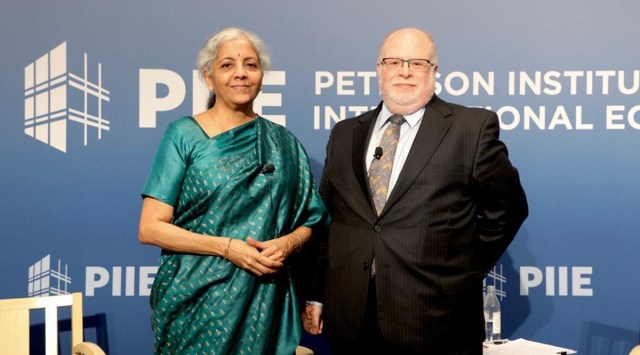Stay updated with the latest - Click here to follow us on Instagram
Nirmala Sitharaman on ‘negative Western perceptions’: Will Muslim population be growing if their lives were made difficult?
Citing widespread reportage on Opposition MPs losing their status and Muslim minorities being subjected to violence, Adam Posen questioned if these 'perceptions' had any impact on India's capital flows.
 Sitharaman was interviewed by the president of US think tank Peterson Institute for International Economics (PIIE), Adam S Posen, in Washington DC. (Twitter/@nsitharamanoffc)
Sitharaman was interviewed by the president of US think tank Peterson Institute for International Economics (PIIE), Adam S Posen, in Washington DC. (Twitter/@nsitharamanoffc) Responding to a question on the impact of the “negative Western perceptions” of India on investment into the subcontinent, Union Finance Minister Nirmala Sitharaman urged prospective investors to “come to have a look at what’s happening in India, rather than listen to perceptions being built by people who have not even visited on the ground and who produce reports.”
Sitharaman was replying to a question posed by the president of US think tank Peterson Institute for International Economics (PIIE), Adam S Posen, in Washington DC.
Citing widespread reportage on Opposition MPs losing their status and Muslim minorities being subjected to violence, Posen questioned if these “perceptions” had any impact on India’s capital flows.
“India has the second-largest Muslim population in the world, and that population is only growing in numbers. If there is a perception, or if there’s a reality, that their lives are difficult or made difficult with the support of the state, which is what is implied in most of these write-ups, I would ask, will the Muslim population be growing than what it was in 1947?” the Finance Minister said.
Speaking on Pakistan, Sitharaman added, “Every minority community in Pakistan is dwindling — decimated to use the harsher word — in numbers. Violence even prevails against Muhajirs, Shia and every other group you can name which is not accepted by the mainstream. I don’t know, Sunnis probably.”
She stated that the notion that across the board in India, violence against Muslims is happening, is a fallacy. “It cannot be so. Each province and its police are different. They are run by the elected governments in those provinces. So, that itself tells you how these reports have no clue of the law and order systems in India,” the finance minister said, reported PTI.
‘Don’t seek to reverse the boon of globalisation, asking for it to be transparent’
While discussing giving impetus to India’s production capacities and global trade, the Finance Minister said, “It’s not to say that we have to reverse the benefits of globalisation. It is more to say, make globalisation more transparent.”
For a very long time, it has been India’s attempt to make sure its manufacturing sector grows. “We have a big play. We also don’t import final consumer goods, which we are capable of manufacturing. However, when you have price discrepancies or price competitiveness affecting your purchasing decisions, you end up buying those which you can produce because they come at a far more, cheaper rate,” she said.
She added: “So, Indians have always had this difficulty in having to come back to producing certain things which are your day-to-day domestic necessities, but you are unable to produce because you find cheaper imports coming or the very same requirement. But now we’ve seen that there is an opportunity which lies, one from the consumer point of view, that even within India, there’s enough purchasing power.”







